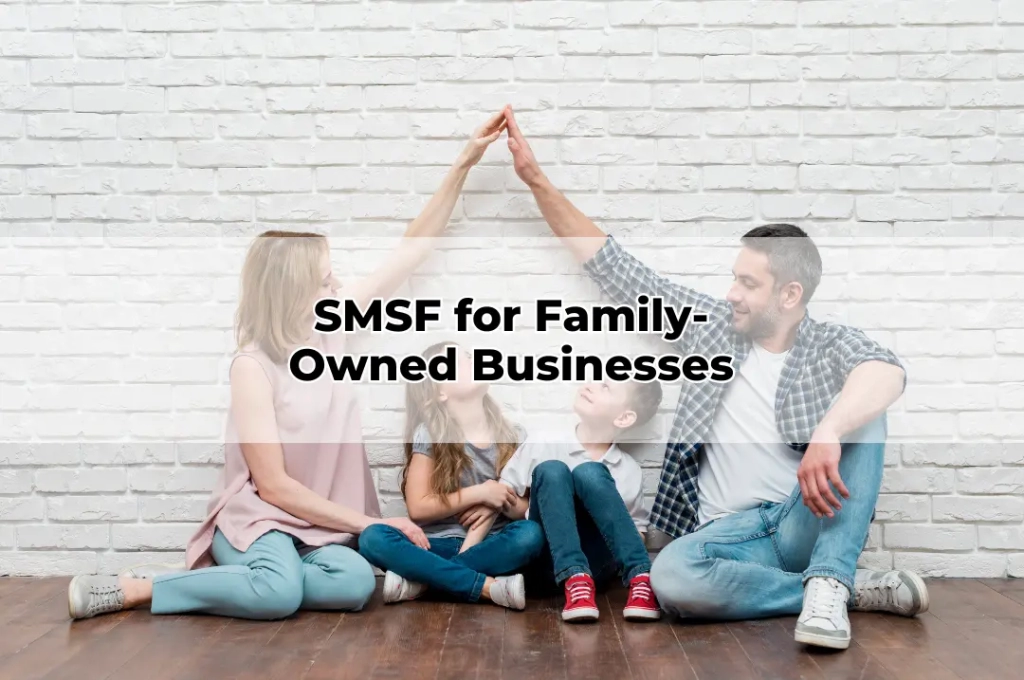SMSF for Family-Owned Businesses
Table of Contents
ToggleEstablishing a Self-Managed Super Fund (SMSF) for a family-owned business can be an effective strategy to maximise retirement savings, consolidate wealth, and enhance financial flexibility. However, setting up an SMSF requires careful planning, understanding the legal framework, and ensuring compliance with Australian regulations. This blog outlines the essential steps to establish an SMSF for family-owned businesses and highlights the advantages and potential pitfalls of such an arrangement.
What is an SMSF?
An SMSF is a private superannuation fund, where members are also trustees, providing greater control over investment decisions. Unlike traditional super funds managed by external organisations, SMSFs allow individuals to tailor their superannuation investments according to their specific needs and goals. For family-owned businesses, an SMSF can be a strategic tool to pool retirement savings, invest in business assets, and secure long-term wealth.
Benefits of an SMSF for Family-Owned Businesses
Family-owned businesses can benefit from an SMSF in several ways. The primary advantage is the control over investment choices, allowing the fund to invest directly in the business, property, or other assets that are of particular interest. SMSFs also offer the potential for tax advantages, asset protection, and succession planning, making them an appealing option for families seeking to manage their wealth holistically.
Eligibility Criteria for Setting Up an SMSF
To establish an SMSF, certain eligibility requirements must be met. The fund must have between one and six members, all of whom must be trustees or directors of a corporate trustee. Importantly, members must also be Australian residents. Additionally, an SMSF must comply with the Superannuation Industry (Supervision) Act 1993 (SIS Act), and all investments must be made for the sole purpose of providing retirement benefits to members.
Setting Up the SMSF Trust Deed
The trust deed is the legal document that outlines the rules for the SMSF. It is essential that the deed reflects the fund’s structure, the duties and powers of the trustees, and the investment strategy. A tailored trust deed can also ensure that the SMSF’s operations align with the specific needs of a family-owned business. It is important to engage a legal professional to ensure the deed complies with the relevant laws and regulations.
Selecting the Trustee Structure for Your SMSF
Family-owned businesses typically choose between two trustee structures: individual trustees or a corporate trustee. Each structure has its advantages and considerations. An individual trustee structure involves each member being a trustee of the fund. This is a simple structure but may involve more administrative burdens. A corporate trustee structure, on the other hand, involves appointing a company as trustee, which can provide greater flexibility and limit members’ personal liability.
Contributing to an SMSF from a Family-Owned Business
Contributing to an SMSF from a family-owned business can be done in several ways, including salary sacrifice, personal contributions, and employer contributions. Salary sacrifice arrangements allow business owners or family members to reduce their taxable income while contributing to their SMSF. Business owners can also make contributions on behalf of employees or family members, which can be an effective way to manage superannuation while benefiting from tax concessions.
Investment Strategies for Family-Owned SMSFs
One of the key benefits of an SMSF is the ability to create a bespoke investment strategy. For family-owned businesses, this could include investing in the business itself, real estate, shares, or other assets that align with the family’s financial objectives. The investment strategy should reflect the risk tolerance, retirement goals, and financial circumstances of the members. It is important to seek advice from a financial adviser to ensure the strategy is sound and compliant with regulations.
Investing in the Family Business through SMSF
Investing in a family-owned business through an SMSF can be an attractive option, allowing the business to access capital while giving family members a stake in the business. However, there are strict rules governing such investments. The investment must be made at arm’s length, meaning it must be on commercial terms and not involve related party transactions that could breach the SIS Act. Proper documentation and valuation are crucial when structuring these investments.
Understanding the Sole Purpose Test
A critical consideration for SMSFs is the ‘sole purpose test’. The SMSF must be maintained solely for the purpose of providing retirement benefits to its members. This means that any investment or transaction made by the SMSF must be aimed at benefiting members’ retirement and not for personal or business use. For family-owned businesses, this means that while investing in the business is possible, the business’s assets cannot be used for personal gain outside of the fund’s retirement objective.
Legal and Regulatory Compliance
Compliance with the Australian Taxation Office (ATO) regulations is essential for the successful operation of an SMSF. This includes adhering to contribution limits, investment restrictions, and annual auditing requirements. Family businesses must ensure that the SMSF’s operations are transparent, properly documented, and fully compliant with superannuation laws. Failure to comply can result in heavy penalties or even the deregistration of the fund.
Role of an SMSF Auditor
An SMSF auditor plays a critical role in ensuring the fund meets the required legal and regulatory standards. The auditor reviews the SMSF’s financial statements, investment decisions, and overall compliance with the SIS Act. For family-owned businesses, engaging a qualified SMSF auditor is essential to maintaining the integrity of the fund and ensuring its long-term viability.
Succession Planning for Family-Owned SMSFs
Succession planning is a key consideration for family-owned businesses when setting up an SMSF. The fund should have provisions in place to deal with changes in family membership, such as the death or departure of a trustee. Clear succession planning ensures that the business and SMSF can continue to operate smoothly, and that the interests of all family members are protected. This may involve updating the trust deed, reassigning trustees, or setting up additional structures to ensure the fund operates in accordance with the family’s long-term goals.
Potential Pitfalls and Challenges
While SMSFs offer numerous benefits, there are also potential risks and challenges. One of the key risks is the administrative complexity involved in managing the fund. Trustees must remain compliant with superannuation laws, which can be time-consuming and require specialist knowledge. Additionally, the rules around related party transactions and investments in the family business can be difficult to navigate. Engaging professional advice is crucial to avoid costly mistakes and ensure the SMSF remains compliant.
The Role of a Financial Adviser in Setting Up an SMSF
A financial adviser plays a pivotal role in guiding family-owned businesses through the process of setting up an SMSF. From determining the appropriate trustee structure to developing an investment strategy, an experienced adviser can help ensure that the SMSF is set up correctly and in line with both legal and financial objectives. Working with a financial adviser can also provide peace of mind, knowing that the SMSF is being managed in the best interests of all family members.
Conclusion
Setting up an SMSF for a family-owned business can be a strategic decision that offers significant financial benefits. However, it is essential to understand the legal framework, eligibility criteria, and investment strategies involved. By carefully planning and seeking professional advice, family businesses can leverage the power of an SMSF to manage their wealth, enhance retirement savings, and create a legacy for future generations.
For family businesses looking to secure their financial future, consulting with a trusted Toowoomba financial adviser can provide invaluable insights and support in setting up and managing an SMSF.









